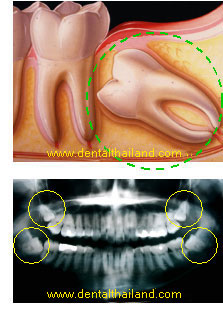Wisdom
teeth are a valuable asset to
the mouth when they are healthy
and properly positioned. Often,
however, problems develop that
require their removal. When the
jaw isn't large enough to
accommodate wisdom teeth, they
can become impacted (unable to
come in or misaligned). Wisdom
teeth may grow sideways, emerge
only part way from the gum or
remain trapped beneath the gum
and bone.
 Extraction of wisdom teeth is
generally recommended when: Extraction of wisdom teeth is
generally recommended when:
- Wisdom teeth only
partially erupt. This leaves an
opening for bacteria to enter
around the tooth and cause an
infection. Pain, swelling, jaw
stiffness and general illness
can result.
- There
is a chance that poorly aligned
wisdom teeth will damage
adjacent teeth.
- A
cyst (fluid-filled sac) forms,
destroying surrounding
structures such as bone or tooth
roots.
FAQS
| A |
Why It Is Done? |
| Q |
A wisdom tooth is extracted to correct an actual or potential problem. When wisdom teeth come in, a number of problems can occur :
- Your jaw may not be large enough to accommodate them, and they may become impacted and unable to break through your gums. This happens in about 20% of people.1
- Your wisdom teeth may break partway through your gums, causing a flap of gum tissue to grow over them. Food can become trapped under the flap and cause your gums to become red, swollen, and painful.
- More serious problems can develop from impacted teeth, such as infection, damage to other teeth and bone, or the development of a cyst.
- One or more of your wisdom teeth may come in at an awkward angle, with the top of the tooth facing forward, backward, or to either side. |
| A |
How well it works? |
| Q |
Wisdom tooth removal usually is effective in preventing:
- Crowding of the back teeth.
- A wisdom tooth becoming stuck in the jaw (impacted) and never breaking through the gums.
- Red, swollen, and painful gums caused by a flap of skin around a wisdom tooth that has only partially come in.
- Gum disease and tooth decay in the wisdom teeth, which may be harder to clean than other teeth. |
| A |
When is the best time to do? |
| Q |
If removal of the wisdom teeth is necessary, the procedure is recommended in the late teenage years, before the roots are completely formed. Surgical procedures in general are better tolerated when one is young and healthy, and the gum tissues tend to heal better and more predictably when young. Most people experience minimal disruption of their normal routines, and time off from work or school is usually minimal. At this point it is worth nothing that the removal of wisdom teeth can be of great benefit to your ultimate oral and general health. |
Healing Tips
1. DO apply pressure to stop the
bleeding by placing the gauze
directly over the
extraction site.
2. DO apply ice packs to your face to
reduce swelling the day of
surgery.
3. DO eat
soft foods, such as soups and
blenderized meals after the
bleeding stops.
4. DO take
antibiotics or pain-reducing
medication if prescribed.
5. DON’T chew hard or crunchy foods such
as nuts or popcorn for 2 weeks.
These
foods could become
lodged in the extraction site or
fracture the weakened jawbone.
6. DON’T rinse your mouth or spit
forcefully the day of surgery;
it could loosen the blood
clot.
7. DON’T smoke after surgery. Inhaling
creates suction and it could
loosen the blood
clot.
8. DON’T over exert yourself.
9. DON’T drink alcohol the day of surgery
or while taking pain
medications. |